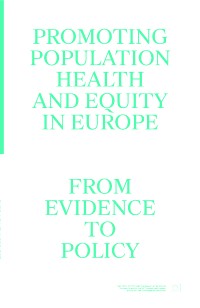Please use this identifier to cite or link to this item:
https://hdl.handle.net/10316.2/78897| DC Field | Value | Language |
|---|---|---|
| dc.contributor.author | Santana, Paula (coord.) | por |
| dc.date.accessioned | 2017-11-22T23:48:33Z | |
| dc.date.accessioned | 2020-03-27T16:55:29Z | - |
| dc.date.available | 2017-11-22T23:48:33Z | |
| dc.date.available | 2020-03-27T16:55:29Z | - |
| dc.date.issued | 2017 | - |
| dc.identifier.isbn | 978-989-20-8021-5 | por |
| dc.identifier.isbn | 978-989-26-1500-4 (pdf) | por |
| dc.identifier.uri | https://hdl.handle.net/10316.2/78897 | por |
| dc.description.abstract | The EURO-HEALTHY project (Shaping EUROpean policies to promote HEALTH equitY) is a three-year Horizon 2020 research project launched in January 2015 aiming to advance knowledge of policies that have the highest potential to enhance health and health equity across European regions with particular focus on urban areas. Within the EU Horizon 2020 research and innovation programme, the call “Foresight for health policy development and regulation” underpinned the need for more meaningful information, particularly on the regional health inequalities within the EU. Consequently, EURO-HEALTHY developed a comprehensive and structured framework of analysis, integrating and quantifying key factors impacting population health and health inequalities, taking the EU’s diversity into account and foreseeing the impact of policies. Following a socio-technical approach, the sound methods were built through highly participatory processes involving a large group of multidisciplinary experts and key stakeholders at different geographical levels. The methods were applied to analyse health and identify geographical health inequalities in 269 NUTS 2 regions, ten selected metropolitan areas and two city case studies. In this publication, we present some of the main findings, conclusions and recommendations of the EURO-HEALTHY project. The booklet consists of: I) Profiles of each Work Package summarizing their work and II) Fact sheets that present an overview of evidence on thematic areas going from the relationship between health status and a wide range of determinants, to specific methodological aspects including the evaluation of health and of policies with potential to promote health and health equity. Our desire is that the evidence shared in this informative booklet would be a starting point for policymakers and concerned stakeholders to enhance their understanding on what are the drivers of health inequalities in Europe and, thus be a trigger to an extended dialogue on what are the policies having the highest benefit in promoting more equitable and healthy environments at different levels (European, regional and local). | eng |
| dc.format.extent | 104 p. | por |
| dc.language.iso | eng | por |
| dc.publisher | Imprensa da Universidade de Coimbra | por |
| dc.rights | open access | por |
| dc.title | Promoting population health and equity in Europe: from evidence to policy | por |
| dc.type | book | por |
| dc.identifier.doi | 10.14195/978-989-26-1500-4 | por |
| uc.publication.digCollection | PB | por |
| uc.publication.area | Ciências Sociais | por |
| uc.publication.manifest | https://dl.uc.pt/json/iiif/10316.2/78897/160243/manifest?manifest=/json/iiif/10316.2/78897/160243/manifest | - |
| uc.publication.thumbnail | https://dl.uc.pt/retrieve/9206032 | - |
| uc.itemId | 56854 | - |
| item.grantfulltext | open | - |
| item.fulltext | With Fulltext | - |
| Appears in Collections: | Pombalina | |
Files in This Item:
| File | Description | Size | Format | |
|---|---|---|---|---|
| promoting_population_health.pdf | 33.56 MB | Adobe PDF |  |
Items in DSpace are protected by copyright, with all rights reserved, unless otherwise indicated.
